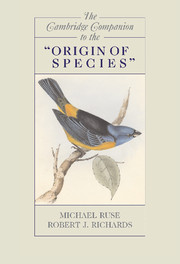Book contents
- Frontmatter
- Foreword
- Introduction
- 1 The Origin of the Origin
- 2 Darwin’s Analogy between Artificial and Natural Selection in the Origin of Species
- 3 Variation and Inheritance
- 4 Darwin’s Theory of Natural Selection and Its Moral Purpose
- 5 Originating Species: Darwin on the Species Problem
- 6 Darwin’s Keystone: The Principle of Divergence
- 7 Darwin’s Difficulties
- 8 Darwin’s Geology and Perspective on the Fossil Record
- 9 Geographical Distribution in the Origin of Species
- 10 Classification in Darwin’s Origin
- 11 Embryology and Morphology
- 12 Darwin’s Botany in the Origin of Species
- 13 The Rhetoric of the Origin of Species
- 14 “Laws impressed on matter by the Creator”? The Origin and the Question of Religion
- 15 Lineal Descendants: The Origin’s Literary Progeny
- 16 The Origin and Political Thought: From Liberalism to Marxism
- 17 The Origin and Philosophy
- 18 The Origin of Species as a Book
- Bibliography
- Index
15 - Lineal Descendants: The Origin’s Literary Progeny
Published online by Cambridge University Press: 28 January 2009
- Frontmatter
- Foreword
- Introduction
- 1 The Origin of the Origin
- 2 Darwin’s Analogy between Artificial and Natural Selection in the Origin of Species
- 3 Variation and Inheritance
- 4 Darwin’s Theory of Natural Selection and Its Moral Purpose
- 5 Originating Species: Darwin on the Species Problem
- 6 Darwin’s Keystone: The Principle of Divergence
- 7 Darwin’s Difficulties
- 8 Darwin’s Geology and Perspective on the Fossil Record
- 9 Geographical Distribution in the Origin of Species
- 10 Classification in Darwin’s Origin
- 11 Embryology and Morphology
- 12 Darwin’s Botany in the Origin of Species
- 13 The Rhetoric of the Origin of Species
- 14 “Laws impressed on matter by the Creator”? The Origin and the Question of Religion
- 15 Lineal Descendants: The Origin’s Literary Progeny
- 16 The Origin and Political Thought: From Liberalism to Marxism
- 17 The Origin and Philosophy
- 18 The Origin of Species as a Book
- Bibliography
- Index
Summary
DARWIN AS READER AND WRITER
Toward the end of his life, in the autobiography written for his family, Darwin remembers his early enthusiasm for literature and other arts with melancholy regret, regret for a taste apparently extinguished by the oncoming of age and the need for endless empirical investigations:
My mind seems to have become a kind of machine for grinding general laws out of large collections of facts, but why that should have caused the atrophy of that part of the brain alone, on which the higher tastes depend, I cannot conceive.
(Autobiography, 139)Darwin distinguishes his continued pleasure in 'books on histories, biographies, and travels … and essays on all sorts of subjects' from his earlier delight in poetry and music:
Up to the age of thirty, or beyond it, poetry of many kinds, such as the works of Milton, Gray, Byron, Wordsworth, Coleridge, and Shelley, gave me great pleasure, and even as a schoolboy I took intense delight in Shakespeare, especially in the historical plays…. But now for many years I cannot endure to read a line of poetry; I have tried lately to read Shakespeare, and found it so intolerably dull that it nauseated me. Music generally sets me thinking too energetically on what I have been at work on, instead of giving me pleasure. I retain some taste for fine scenery, but it does not cause me the exquisite delight that it formerly did.
(Autobiography, 138)- Type
- Chapter
- Information
- The Cambridge Companion to the 'Origin of Species' , pp. 275 - 294Publisher: Cambridge University PressPrint publication year: 2008



